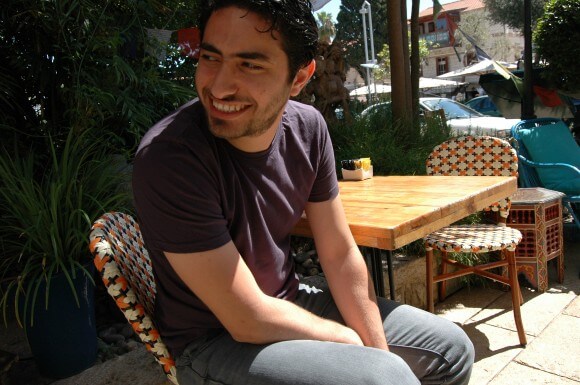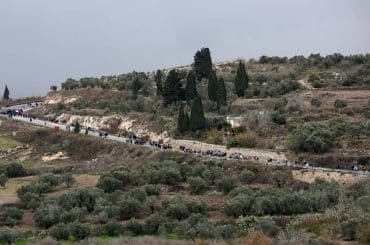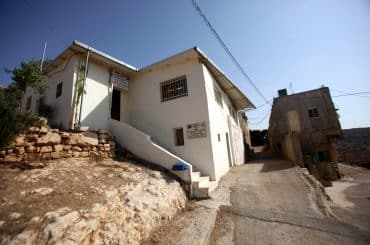
Even though Palestinian journalist Majd Kayyal was released from prison on April 17th for traveling to Lebanon to attend a writers’ conference, he is still under the thumb of Israel’s security services.
Kayyal, an Israeli citizen, was thrown in a basement cell for five days after violating Israel’s ban on travel to “enemy states.” While his Jewish-Israeli colleagues routinely violate the state’s grey travel-ban to Lebanon, Kayyal was harshly punished: in addition to the imprisonment and interrogation, his parents’ houses were ransacked, and Israel’s Shin Bet successfully obtained a gag order barring locally-based media from reporting on the legal proceedings. He was placed under house arrest for a short time and is barred from traveling abroad.
The harsh Israeli retribution even elicited a response from the U.S. State Department after Associated Press reporter Matt Lee raised Kayyal’s case. His arrest caused an additional stir when the Electronic Intifada’s dogged coverage exposed the fact that the New York Times had adhered to the Israeli court-imposed gag order and failed to report on Kayyal. The paper’s public editor eventually weighed in on the case.
Lebanon does not grant entry to Israeli citizens, so Kayyal obtained a special laissez passer from the Palestinian Authority’s cultural ministry to enter. It’s a one-off travel document, rendering Kayyal’s 20-day trip to Beirut his only possible excursion, though he would love to return.
We spoke to Kayyal, a reporter for the Lebanese newspaper As-Safir (“The Ambassador”) and a website editor for Adalah, in his native Haifa over the weekend. We were the first foreign journalists he sat for an extended interview with, as the Israeli authorities also banned the cub reporter from talking with media located abroad. He joked to us that when somebody from the West Bank calls him, he asks, “are you for the one-state solution or the two-state solution? Because if you are for the two-state solution, I cannot talk with you.” In addition to the ban on talking to people abroad, he was placed under five days of house arrest; barred from using the Internet for 21 days, a condition since lifted after appeals by his lawyers; and is prohibited from traveling outside the country for 90 days.
“Until now I live without a computer,” continued Kayyal, explaining that his electronics, books and journals are locked away in an Israeli police station abyss. “They took my notebooks from the fourth grade,” he said while smirking–work from when he was “ten years old.”
Kayyal’s tribulations are only the latest example of Israel’s security services targeting Palestinian citizens who are outspoken. In 2010, for instance, Ameer Makhoul, the leader of a Palestinian NGO network, was arrested and charged with contact with a “foreign agent” and assisting the “enemy” in a time of war–in this case, Hezbollah. While he denied the accusations, Makhoul eventually reached a deal on lesser charges and will remain in jail for a total of nine years.
At the border crossing with Jordan on his return from Beirut, Kayyal was “greeted,” as he delicately put it, by Israel’s secret service. Meanwhile, Kayyal’s family home was being torn apart and searched.
Blindfolded and dumped into a black SUV, he was driven to Jelame jail outside of Haifa where he would stay for the next week in a cell located three floors underground. There, without windows and under 24 hours of blaring artificial light, Kayyal lost track of time during interrogations. At one point, he was tied in the “shabach position,” where a prisoner’s arms and legs are bound to a chair in a stress position. In a 1999 case on torture, the Israeli high court ruled the “shabach position” was part of an illegal regime of physical pressure on detainees. While bound, security agents asked Kayyal about his travels to Lebanon and whether he met with members of Hezbollah, the Lebanese militant group dedicated to fighting Israel. At no point was he allowed to meet with his lawyers from Adalah, the Palestinian rights group, during the five days of detention.
“You feel like you jumped from a big tower, from the top of the exciting life and interesting life. All the action in the Arab world, people are discussing it,” said Kayyal “And then you jump to this hill, to this black place that you are staying in and you don’t know–maybe you will stay here for six months and nobody knows about you.”
Originally under investigation for contact with “foreign agents”–Hezbollah members–the Israeli authorities are now only charging him with visiting an “enemy state,” which could land him in jail for up to four years. Kayyal passed a polygraph test while under questioning, and was careful not to travel to southern Lebanon, where Hezbollah has a large presence.
“People dream about Beirut. Everyday. They want to visit this place,” said Kayyal. During our meeting at a popular café near the Ba’hai Gardens, the freshly-out-of-jail Kayyal was interrupted by friends congratulating him on his trip to Beirut. “You know it’s the place that designed all your personality, your childhood heroes, like when we were children if we thought who are our heroes—like ok, besides Superman and Batman—but you talk about Naji Ali and Ghassan Kanafani, and Yasser Arafat. All these people lived in Beirut and worked in Beirut and were killed in Beirut,” said Kayyal, wheeling into a rhythmic pentameter.
Kayyal’s animation when detailing the Lebanese city could not be overlooked. To him Beirut is part of the landscape of his cultural and historical identity that he was not able to fully recognize until his trip. As a Palestinian, he is culturally of the region, but as an Israeli citizen, the borders of the Jewish state sequester him from the remainder of the Arab world. And as a writer to an Arab audience, his displacement from his geographical and cultural context is particularly jarring, and almost a reverse exile. Whereas in the past Palestinians were forced from their historical homeland, today those that remained and entered the fabric of Israeli society face an existential erasure by Jewish society.
“Beirut is the most important place for us as a Palestinian, more than Jerusalem. Because nothing really happened in Jerusalem”—except to those that originate there. But in Beirut, said Kayyal, the Palestine Liberation Organization became a tour de force, and Beirut housed Palestine’s greatest writers and artists in exile. “We are here in Palestine, but most of our stories happened outside of Palestine, like in Beirut, in Jordan, in Tunisia, in Syria.” he continued. “Our politics as Palestinians is not related to ‘a place’—like the events happened outside of Palestine.”
But in his beloved Beirut, “it’s the opposite. There everything happened in the same city… There is no corner, there is no place, there is no street that doesn’t have a story of a war, of a political party.” He added, “Haifa is the most beautiful city” in the Middle East, but that in Beirut, one feels more part of the broader region and material spaces that constructed his tastes and his aesthetics.


Ah such respect for freedom of the press they have in Jewish Disneyland…
Meanwhile Israeli Jews with slogans on THEIR Facebook pages like “kill the Arabs” walk around footloose and fancy free. But I’m sure that the Zionists that post here will offer a perfectly good explanation for that.
Cruelty, preventing journalists from writing the truth, and discrimination, alive and well in zioland. Hey Barbara Boxer, what do you think of the “only democracy” in the Middle East now?
Israel’s Lisa Goldman visited Beirut twice after the war of 2006. Once on her own and when she returned to Israel, the Channel 2 or 10 people sent her back to file a report from there. She entered Lebanon using her Canadian passport and on her return and after her program was aired on Israeli TV, was detained for questioning for a couple of hours only.
Kayyal as a Palestinian-Israeli doesn’t have this privilege.
Yeah sure Majd was gonna get the shin-bet-hollywood treatment. No surprises there that the zionist regime behaves like the fascists they are – and I think Majd is well aware of this too. Which is probably why he seems to be more interested in sharing his thrilling experience about visiting Lebanon with us. A precious experience for Majd and a memory that the zionists will never be able to confiscate or kidnap at gunpoint (heheheh!).
There is nothing like being a virgin visitor to Beirut – or anywhere else in the Lebanon for that matter. Beautiful, wondrous, hectic with history. I wholeheartedly encourage readers and mondoweisserz to seriously consider taking a trip there. But too bad bro Majd wasn’t allowed to visit the south of Lebanon cuz when you go there, you enter a unique domain steeped in the history of both Lebanese and Palestinian resistance. The south of Lebanon is where the Nakba was immediately felt (outside of Palestine) and so therefore the location that was impacted pretty hard by the ethnic cleansing of Palestine in 1948. The destiny and future of Lebanon remains umbilically connected to that of Palestine’s. The liberation of Palestine is very serious business for Lebanon, considering especially the zionist’s avarice and greed for water, notably the waters of the Lebanese Litani River that runs some 25 kilometers(?) parallel to the Lebanese-israeli border.
What’s really super cool about exploring the south of Lebanon is that it’s both beautiful AND liberated land – driving around there you feel it, you really do – so many beautiful and peaceful hills strung together as far as the eye can see: you can’t even imagine that for eighteen years, till the year 2000, rows of Markavas used to chuggle and clang along the endless winding white-knuckle roads of south Lebanon. Every Palestinian should take a tour of south Lebanon and just feel it, feel the goodness of freedom – feel the possibilities for Palestine.
When I lived in Beirut as a child (1970-1975), I was fortunate enough to meet many of the Palestinian intelligentsia exiled in Lebanon, mentioned above by Majd – I went to school with Kanafani’s two boys – I was around these people a lot and I can tell you, mondofolk, that these Palestinians in exile were perpetually heartbroken and outraged by the Nakba – I grew up hearing these people’s personal Nakba stories. Yeah they enjoyed Lebanon, sure they loved Beirut, but their hearts belonged to Palestine. What great people Palestine has birthed. It was a pleasure, an honor, and a sorrow to know them.
Pappe on the Nakba:
http://www.bintjbeil.com/articles/en/021020_pappe.html